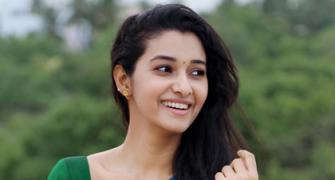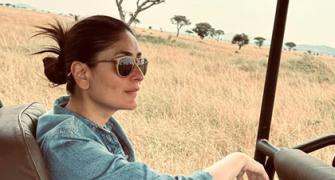Sonia Shah, one of America's best known investigative journalists, who is currently working on what she describes as a book on the history and politics of malaria, is in the news again.
Following the airing of the documentary Crude on the History Channel recently and its release on DVD, Shah is appearing across America to discuss the politics of oil.
The History Channel documentary is partly based on her 2004 book Crude: The Story of Oil. Shah is best known for The Body Hunters: Testing New Drugs on the World's Poorest Patients.

Shah's television appearances include A&E and BBC, and she has consulted on many documentary film projects, from the ABC to Channel 4 in the UK.
A former writing fellow of The Nation Institute and the Puffin Foundation, Shah will have her new book on malaria published by the distinguished independent firm Farrar, Straus & Giroux.
Her book Crude was acclaimed by many publications, including the Guardian and The Nation, and has been translated into more than a dozen languages including German, French, Japanese, Greek, and Bahasa Indonesia.
"Newborn babies," Sonia Shah observed, "slide from their mothers into petro-plastic-gloved hands, are swaddled in petro-polyester blankets, and are hurried off to be warmed by oil-burning heaters." The modern world is drenched in oil, she says.
"A few years ago, a documentary film-maker from the ABC in Sydney (the Australian public television network) spent a day with me in Boston, talking about oil politics," she wrote in her journal.
"His film, which he dubbed Crude (after kindly discussing it with me), came out in Australia a few years ago, and won a slew of awards. It has some amazing footage in it, the least of which are some clips from that day in Boston with me. (A film crew followed me around at the grocery store while I pretended to shop. Slightly embarrassing)," Shah said.
Shah, daughter of immigrant physicians, has written for The Washington Post, The Boston Globe, New Scientist, The Nation and elsewhere.
The Body Hunters: Testing New Drugs on the World's Poorest Patients was published two years ago.
Publishers Weekly called it "a tautly argued study a trenchant exposé meticulously researched and packed with documentary evidence."
It had a preface by The Constant Gardener author John Le Carré, who called it 'an act of courage.'
"Imagine the uproar if dozens of drug-trial patients in America were to perish from deadly side effects known to the FDA," wrote Le Carre, best-known for his espionage novels such as Smiley's People.
"Consider the commotion if AIDS babies in Europe were to die while being administered placebos rather than potentially life-saving drugs. These scandals did happen -- just elsewhere," he added.
Shah said the book resulted from several years of investigation. While many journalists covering similar ground gave up reportedly under pressure from pharmaceutical industries, Shah stood her ground.
"I have personally benefited from modern medicine," Shah had said in an interview with rediff India Abroad when the book was published.
"But when I slowly came to know the harm that is done by pharmaceutical companies, I could not remain silent. But I also wanted to make sure that my research was thorough. I did not want to sound like a shrill politician," Shah said.
Shah, born in 1969 in New York City, shuttled between north-eastern US and Mumbai and Bangalore in India.
"My working class family lived in Mumbai but also in Coimbatore and Bangalore," she said, and added, "and that is how I began to develop a life-long interest in inequality between and within societies."
Shah, who has a BA in journalism, philosophy, and neuroscience from Oberlin College, lives near Boston with molecular ecologist Mark Bulmer and their two sons Zakir and Kush.
Her visits to India are vivid in her mind. "From my grandmother's second-floor back porch in dusty Coimbatore, I could see the villagers squatting on the crest of the hill, their naked bums neatly lined in a row for the daily purge," she writes on her Web site.
"At age seven, this was a mesmerising sight. I gained a reputation for dreaminess, for nobody knew what I was really looking at, resting my head on my arms and staring off into the distance for hours at a time. Up north, at my mother's tenement flat in Mumbai, there were toilets to use, but these were located at the end of the open-air hallway, next to the wet, reeking terrace where the building's servants sloshed water on dal-spattered steel plates.
The doors to the stalls were covered in a living carpet of brown and green. I avoided them as much as possible, resulting in daily stomach-aches, to be soothed with neem oil. To indulge me, I was sometimes allowed to shit on newspapers in the bedroom, which were then wrapped up and tossed out the window into the alley.
People I knew slept in the alley. I had stumbled across a child down there, once. The bottom half of his leg was greyed and pimpled, bloated into a fat cylinder by filarial worms. His toenails stuck out from under the heavy folds and flaps, tiny shards.
As an American-born child, sent to stay with relatives in India every summer, all of this was shocking, and fascinating. Back at home, wads of gossamer-thin, perfumed paper tissue, imprinted with lacy designs, were used to cushion each tiny smear of snot as it swirled down the commode's shiny porcelain.
Here, people cleared their nasal passages directly into a stinking gutter. All of this -- the poverty, the disease, the disparity -- must be related, I thought. For a seven-year-old, every mysterious thing in the world is secretly connected. Growing up meant figuring out how."








